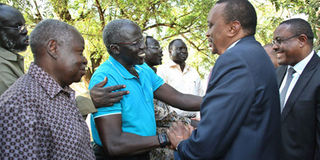IGAD 'considering power sharing' to end strife in S. Sudan

A handout picture taken and released by Kenya's Presidential Strategic Communications Unit (PSCU) on December 26, 2013 shows Kenyan President Uhuru Kenyatta (2nd R) and Ethiopian Prime Minister Hailemariam Desalegn (2nd R) shaking hands with South Sudanese political detainees held in government custody during a visit to Juba. The release of political prisoners and a coalition arrangement are some of the key issues set to be discussed by regional leaders converging in Nairobi to help stop the violence in South Sudan. AFP PHOTO/HO/PSCU
What you need to know:
- Regional leaders under the banner IGAD are converging in Nairobi Friday to push forward their search for a solution to the South Sudan problem which has seen hundreds of foreigners flee and thousands of South Sudanese seek refuge in UN camps.
- By 2pm Kenyan time, Uganda’s President Yoweri Museveni, South Sudan’s Salva Kiir, Somalia’s Hassan Sheikh Mohamoud, Ethiopia’s Hailemariam Desalegn and Ismael Omar Guelleh were in attendance.
The release of political prisoners and a coalition arrangement are some of the key issues set to be discussed by regional leaders converging in Nairobi to help stop the violence in South Sudan.
A source close to the 23rd Extra-Ordinary Session of the Intergovernmental Authority on Development (IGAD) meeting happening in Nairobi on Friday has told the Nation leaders will consider power sharing as one of the options to help end the chaos in Africa’s youngest nation.
“There is a strong desire to end the violence and leaders have seen this is a political problem which can be solved if everyone is brought on board,” said a source who requested to remain anonymous but who is privy to the meeting indicated.
Regional leaders under the banner IGAD are converging in Nairobi Friday to push forward their search for a solution to the South Sudan problem which has seen hundreds of foreigners flee and thousands of South Sudanese seek refuge in UN camps.
A statement from IGAD said the Special Summit for the Heads of State and Government will be addressing key options for Africa’s youngest nation which on December 16 descended into chaos.
“Being an extraordinary session, all heads of state and government from IGAD Member Countries; Djibouti, Ethiopia, Kenya, Somalia, South Sudan, Sudan and Uganda are expected to attend. The communiqué should be expected much later,” IGAD said in a statement sent to newsrooms.
IN ATTENDANCE
By 2pm Kenyan time, Uganda’s President Yoweri Museveni, South Sudan’s Salva Kiir, Somalia’s Hassan Sheikh Mohamoud, Ethiopia’s Hailemariam Desalegn and Ismael Omar Guelleh were in attendance. Representatives from Sudan were also attending the State House meeting.
Kenya on Saturday started the evacuation of more than 1600 Kenyans thought to have been trapped in Juba. On Wednesday, the government announced that it had chartered two Kenya Airways planes to help reinforce the evacuation programme.
But IGAD to which Kenya is a founding member has been making overtures to the key antagonists to the conflict; President Salva Kiir of South Sudan, sacked Vice President Riek Machar and that nation’s founding father’s widow Rebecca Garang’ to find a solution. Already, the bloc’s efforts have been supported by the European Union.
On Thursday, President Uhuru Kenyatta and Ethiopian Premier Hailemariam Desalegn toured Juba during which they met both President Kiir and the detained political prisoners which Juba suspects fuelled a mutiny two weeks ago that later spread into violence around the country.
Both sides have indicated they want to hold talks but the Machar camp has indicated the Kiir releases political prisoners first because they are part of the solution.
KENYA SITUATION
Power sharing was used to quell violence in Kenya in 2008 following disputed General Election in which 1, 113 people died and 600, 000 ejected from their homes. But it would depend on the acceptance from both sides that such an option is workable. Given Kenya’s experience of the Grand coalition, power sharing may not necessarily end hostilities between antagonists, but it serves to stop bloodshed.
The UN last week warned that South Sudan was slowly moving towards crimes against humanity following the discovery of a secret grave in Bentiu, Unity State. However, the global body has since sent reinforcements of peace keepers to the country.




